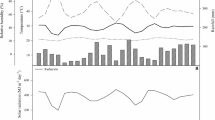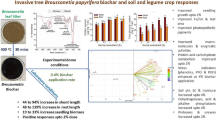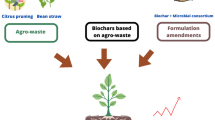Abstract
The effects of coffee biochar residue combined with cow manure fertilizer on soil chemical attributes, microbial biomass, and structure and abundance of the soil microbial community are not fully understood. Thus, the objective of this study was to evaluate the effect of coffee biochar combined with cow manure on chemical and microbial attributes in soil cultivated with bean (Phaseolus vulgaris). We hypothesized that biochar from coffee residues drives the bacteria, fungi, and diazotrophic communities in a sandy soil and increases the abundance of these microorganism groups, raising soil basal respiration and microbial biomass. The experiment was carried out in a completely randomized design and was distributed in a factorial scheme (2 × 3 + 2) including two types of biochar (coffee ground-CG and coffee husk-CH) at three dosages (4, 8, and 16 t ha−1), and two control groups (S = native soil without treatment (−control) and E = fertilization with cow manure at dosage of 15 m3 ha−1 (+control)). The experiments were conducted with four repetitions. All treatments received the same dosage of cow manure applied in sandy soil and bean seeds were grown in pots. Soil samples were collected after 45 days to evaluate chemical attributes, total organic carbon (TOC), microbial biomass (C, N, and P), soil basal respiration, structure and abundance of total bacterial and fungal community (16S rRNA, 18S rRNA) and diazotrophs (nifH) in the soil by DGGE (denaturing gradient gel electrophoresis) and qPCR (real-time quantitative PCR), respectively. The results showed that TOC increased 9 and 11.5% with highest dosage of CG and CH biochar, respectively; thus, CG at 4 t ha−1 increased the C:N ratio in soil (4.7 times). The addition of biochar combined with cow manure increased soil basal respiration in CG at 16 t ha−1. The combined application of CH at 16 t ha−1 and cow manure increased the P content (2.37 times) and K+ (5.6 times). The highest increase in C from microbial biomass was found in CG at 16 t ha−1 and the addition of biochar and cow manure did not affect the P content in microbial biomass; nevertheless, biochar increased the nifH gene abundance by 8.23% at 16 t ha−1. Biochar addition influenced the structure of soil microbial communities, presenting distinct and well-differentiated communities in the multivariate analysis, according to the dosage and type of biochar. The group formed by different CG dosages showed a higher number of 16S genes, and greater amounts of Nmic, nifH, soil basal respiration, metabolic quotient, K, and Na. The major conclusion of this study was that coffee biochar, used in combination with cow manure, significantly improves the chemical and microbiological attributes of sandy soil cultivated with bean.


Similar content being viewed by others
References
Adekoya AO, Agbede TM, Aboyeji CM, Dunsin O, Simeon VT (2019) Effects of biochar and poultry manure on soil characteristics and the yield of radish. Sci Hortic 243:457–463. https://doi.org/10.1016/jscienta201808048
Alef K, Nannipieri P (1995) Methods in applied soil microbiology and biochemistry. Academic Press 608p
Amoah-Antwi C, Kwiatkowska-Malina J, Thornton SF, Fenton O, Malina G, Szara E (2020) Restoration of soil quality using biochar and brown coal waste: a review. Sci Total Environ 722:137852. https://doi.org/10.1016/jscitotenv2020137852
Anderson MJ, Willis TJ (2003) Canonical analysis of principal coordinates: a useful method of constrained ordination for ecology. Ecology 84:511–525. https://doi.org/10.1890/0012-9658(2003)084[0511:CAOPCA]2.0.CO;2
Anderson T-H, Domsch KH (1993) The metabolic quotient for CO2 (qCO2) as a specific activity parameter to assess the effects of environmental conditions, such as pH, on the microbial biomass of forest soils. Soil Biol Biochem 25:393–395. https://doi.org/10.1016/0038-0717(93)90140-7
Bao L, Cai W, Cao J, Zhang X, Liu J, Chen H, Bai Z (2020) Microbial community overlap between the phyllosphere and rhizosphere of three plants from Yongxing Island, South China Sea. MicrobiologyOpen 9:e1048. https://doi.org/10.1002/mbo3.1048
Bruun S, Clauson-kaas S, Bobulská L, Thomsen IK (2014) Carbon dioxide emissions from biochar in soil: role of clay, microorganisms, and carbonates. Eur J Soil Sci 65:52–59. https://doi.org/10.1111/ejss12073
Castaldi S, Riondino M, Baronti S, Esposito FR, Marzaioli R, Rutigliano FA, VaCGari FP, Miglietta F (2011) Impact of biochar application to a Mediterranean wheat crop on soil microbial activity and greenhouse gas fluxes. Chemosphere 85:1464–1471. https://doi.org/10.1016/jchemosphere201108031
Castro DB, Pedrosa EM, Montenegro AA, Rolim MM, Leitão DA, Oliveira AKS (2016) Spatial variability of Regosol chemical atributes in guava management with neem under semi-arid conditions. Rev Bras Eng Agríc Ambient 20:618–624. https://doi.org/10.1590/1807-1929/agriambi.v20n7p618-624
Chen J, Sun X, Li L, Liu X, Zhang B, Zheng J, Pan G (2016) Change in active microbial community structure, abundance, and carbon cycling in an acid rice paddy soil with the addition of biochar. Eur J Soil Sci 67:857–867. https://doi.org/10.1111/ejss12388
Chen J, Wang P, Wang C, Wang X, Miao L, Liu S (2019) Dam construction alters function and community composition of diazotrophs in riparian soils across an environmental gradient. Soil Biol Biochem 132:14–23. https://doi.org/10.1016/j.soilbio.2019.01.020
Chintala R, Mollinedo J, Schumacher TE, Malo DD, Julson JL (2014) Effect of biochar on chemical properties of acidic soil. Arch Agron Soil Sci 60:393–404. https://doi.org/10.1080/036503402013789870
Dai Z, Barberán A, Li Y, Brookes PC, Xu J (2017) Bacterial community composition associated with pyrogenic organic matter (biochar) varies with pyrolysis temperature and colonization environment. Msphere 2:e00085–e00017. https://doi.org/10.1128/mSphere.00085-17
De Barros JA, De Medeiros EV, Da Costa DP, Duda GP, de Sousa Lima JR, Dos Santos UJ, Hammecker C (2019) Human disturbance affects enzyme activity, microbial biomass and organic carbon in tropical dry sub-humid pasture and forest soils. Arch Agron Soil Sci 66:1–15. https://doi.org/10.1080/0365034020191622095
De Medeiros EV, Lima NT, de Sousa Lima JR (2021) Biochar as a strategy to manage plant diseases caused by pathogens inhabiting the soil: a critical review. Phytoparasitica 1:1–14. https://doi.org/10.1007/s12600-021-00887-y
Ding Y, Liu Y, Liu S, Li Z, Tan X, Huang X, Zheng B (2016) Biochar to improve soil fertility. A review. Agron Sustain Dev 36:1–18. https://doi.org/10.1007/s13593-016-0372-z
El-Eyuoon A, Amin AZ (2020) Carbon sequestration, kinetics of ammonia volatilization and nutrient availability in alkaline sandy soil as a function on applying calotropis biochar produced at different pyrolysis temperatures. Sci Total Environ 726:138489. https://doi.org/10.1016/j.scitotenv.2020.138489
El-Naggar A, Lee SS, Rinklebe J, Farooq M, Song H, Sarmah AK, Zimmerman AR, Ahmad M, Shaheen SM, Ok YS (2019) Biochar application to low fertility soils: a review of current status, and future prospects. Geoderma 337:536–554. https://doi.org/10.1016/jgeoderma201809034
EMBRAPA – Empresa Brasileira de Pesquisa Agropecuária Embrapa Solos (2009) Manual de análises químicas de solos, plantas e fertilizantes. Brasília: EMBRAPA, 2:627. (in Portuguese)
Fierer N, Jackson JA, Vilgalys R, Jackson RB (2005) Assessment of soil microbial community structure by use of taxon-specific quantitative PCR assays. Appl Environ Microbiol 71:4117–4120. https://doi.org/10.1016/10.1128/AEM.71.7.4117-4120.2005
Gardes M, Bruns TD (1993) ITS primers with enhanced specificity for basidiomycetes-application to the identification of mycorrhizae and rusts. Mol Ecol 2:113–118. https://doi.org/10.1111/j.1365-294X.1993.tb00005.x
Godlewska P, Schmidt HP, Ok YS, Oleszczuk P (2017) Biochar for composting improvement and contaminants reduction. A review. Bioresour Technol 246:193–202. https://doi.org/10.1016/j.biortech.2017.07.095
Gul S, Whalen JK, Thomas BW, Sachdeva V, Deng H (2015) Physico-chemical properties and microbial responses in biochar-amended soils: Mechanisms and future directions. Agric Ecosyst Environ 206:49–59 101016/jagee201503015
Harter J, Weigold P, El-Hadidi M, Huson DH, Kappler A, Behrens S (2016) Soil biochar amendment shapes the composition of N2O-reducing microbial communities. Sci Total Environ 562:379–390. https://doi.org/10.1016/j.scitotenv.2016.03.220
He LL, Zhong ZK, Yang HM (2017) Effects on soil quality of biochar and straw amendment in conjunction with chemical fertilizers. J Integr Agric 16(3):704–712. https://doi.org/10.1016/S2095-3119(16)61420-X
Huang D, Liu L, Zeng G, Xu P, Huang C, Deng L, Wang R, Wan J (2017) The effects of rice straw biochar on indigenous microbial community and enzymes activity in heavy metal-contaminated sediment. Chemosphere 174:545–553. https://doi.org/10.1016/j.chemosphere.2017.01.130
IUSS Working Group WRB (2015) World Reference Base for Soil Resources (2014) update 2015 International soil classification system for naming soils and creating legends for soil maps World Soil Resources Reports No 106 FAO, Rome
Kannan P, Paramasivan M, Marimuthu S, Swaminathan C, Bose J (2021) Applying both biochar and phosphobacteria enhances Vigna mungo L. growth and yield in acid soils by increasing soil pH, moisture content, microbial growth and P availability. Agric Ecosyst Environ 308:107258. https://doi.org/10.1016/j.agee.2020.107258
Khadem A, Raiesi F (2017) Responses of microbial performance and community to corn biochar in calcareous sandy and clayey soils. Appl Soil 114:16–27. https://doi.org/10.1016/japsoil201702018
Lima JRS, Silva WM, Medeiros EV, Duda GP, Corrêa MM, Martins Filho AP, Clermont-Dauphin C, Antonino ACD, Hammecher C (2018) Effect of biochar on physicochemical properties of a sandy soil and maize growth in a greenhouse experiment. Geoderma 319:14–23. https://doi.org/10.1016/jgeoderma201712033
Lin-Lin J, Guang-Ming H, Yu L, Sai-Nan L, Ji-** G, Xu Y, Jun M, Wen-Fu C (2017) Corn cob biochar increases soil culturable bacterial abundance without enhancing their capacities in utilizing carbon sources in Biolog Eco-plates. J Integr Agric 16:713–724. https://doi.org/10.1016/S2095-3119(16)61338-2
Liu X, Liu C, Gao W, Xue C, Guo Z, Jiang L, Li F, Liu Y (2019) Impact of biochar amendment on the abundance and structure of diazotrophic community in an alkaline soil. Sci Total Environ 688:944–951. https://doi.org/10.1016/jscitotenv201906293
Lorenz M, Thiele-Bruhn S (2019) Tree species affect soil organic matter stocks and stoichiometry in interaction with soil microbiota. Geoderma 353:35–46. https://doi.org/10.1016/j.geoderma.2019.06.021
Martins Filho AP, De Medeiros EV, Lima JRS, Duda GP, Silva WM, Antonino ACD, Silva JÁ, de Oliveira JB, Hammecker C (2020) Impact of coffee biochar on soil carbon, microbial biomass and enzymatic activities in semiarid Sandy soil cultivated with maize. Rev Bras Geo Fis 13:903–914
Martins Filho AP, De Medeiros EV, Lima JRS, Duda GP, Silva WM, Antonino ACD, Silva JÁ, de Oliveira JB, Hammecker C (2021) Impact of coffee biochar on carbon, microbial biomass and enzyme activities of a sandy soil cultivated with bean. Annals Braz Ac Sci (In press)
Medeiros EV, Moraes MC, Costa DP, Silva JS, Oliveira JB, Lima, RS, Hammecker, C (2020) Biochar and Trichoderma aureoviride applied to the sandy soil: effect on soil quality and watermelon growth. Not Bot Horti Agrobo 48:735–751. https://doi.org/10.15835/nbha48211851
Mendonça ES, Matos ES (2017) Matéria Orgânica do Solo: Métodos de Análises. Viçosa, UFV 2:154–169 (in Portuguese)
Muyzer G, De Waal EC, Uitterlinden AG (1993) Profiling of complex microbial populations by denaturing gradient gel electrophoresis analysis of polymerase chain reaction-amplified genes coding for 16S rRNA. Appl Environ Microb 59:695–700
Palansooriya KN, Wong JTF, Hashimoto Y, Huang L, Rinklebe J, Chang SX, Bolan N, Wang H, Ok YS (2019) Response of microbial communities to biochar-amended soils: a critical review. Biochar 1:3–22. https://doi.org/10.1007/s42773-019-00009-2
Pandian K, Subramaniayan P, Gnasekaran P, Chitraputhirapillai S (2016) Effect of biochar amendment on soil physical, chemical and biological properties and groundnut yield in rainfed Alfisol of semi-arid tropics. Arch Agron Soil Sci 62:1293–1310. https://doi.org/10.1080/0365034020161139086
Poly F, Monrozier LJ, Bally R (2001) Improvement in the RFLP procedure for studying the diversity of nifH genes in communities of nitrogen fixers in soil. Res Microbiol 152:95–103. https://doi.org/10.1016/s0923-2508(00)01172-4
Rangabhashiyam S, Balasubramanian P (2019) The potential of lignocellulosic biomass precursors for biochar production: performance, mechanism and wastewater application-a review. Ind Crop Prod 128:405–423. https://doi.org/10.1016/**dcrop201811041
Sigua GC, Novak JM, Watts DW, Cantrell KB, Shumaker PD, Szögi AA, Johnson MG (2014) Carbon mineralization in two ultisols amended with different sources and particle sizes of pyrolyzed biochar. Chemosphere 103:313–321. https://doi.org/10.1016/jchemosphere201312024
Silva RAB, Lima JRS, Antonino ACD, Gondim PSS, Souza ES, Barros Júnior G (2014) Balanço hídrico em Neossolo regolítico cultivado com braquiária (Brachiaria decumbens Stapf). Rev Bras Cienc Solo 38:147–157. https://doi.org/10.1590/S0100-06832014000100014 (in Portuguese)
Simonet P, Grosjean MC, Misra AK, Nazaret S, Cournoyer B, Normand P (1991) Frankia genus-specific characterization by polymerase chain reaction. Appl Environ Microb 57:3278–3286
Smit E, Leeflang P, Glandorf B, Van Elsas JD, Wernars K (1999) Analysis of fungal diversity in the wheat rhizosphere by sequencing of cloned PCR-amplified genes encoding 18S rRNA and temperature gradient gel electrophoresis. Appl Environ Microb 65:2614–2621. https://doi.org/10.1128/AEM.65.6.2614-2621.1999
Tian J, Wang J, Dippold M, Gao Y, Blagodatskaya E, Kuzyakov Y (2016) Biochar affects soil organic matter cycling and microbial functions but does not alter microbial community structure in a paddy soil. Sci Total Environ 556:89–97. https://10.1016/j.scitotenv.2016.03.010
Van Asperen HL, Bor AMC, Sonneveld MPW, Bruins HJ, Lazarovitch N (2014) Properties of anthropogenic soils in ancient run-off capturing agricultural terraces in the Central Negev desert (Israel) and related effects of biochar and ash on crop growth. Plant Soil 374:779–792. https://doi.org/10.1007/s11104-013-1901-z
Wang H, Zheng H, Jiang Z, Dai Y, Liu G, Chen L, Wang Z (2017) Efficacies of biochar and biochar-based amendment on vegetable yield and nitrogen utilization in four consecutive planting seasons. Sci Total Environ 593:124–133. https://doi.org/10.1016/jscitotenv201703096
Weber K, Quicker P (2018) Properties of biochar. Fuel 217:240–261. https://doi.org/10.1016/jfuel201712054
White TJ, Bruns T, Lee SJWT, Taylor J (1990) Amplification and direct sequencing of fungal ribosomal RNA genes for phylogenetics In: Innis MA, Gelfand DH, Sninsky JJ, White TJ, editors. PCR protocols: a guide to methods and applications. PCR Protocols: A guide to methods and applications, 3:15–22
Xu N, Tan G, Wang H, Gai X (2016) Effect of biochar additions to soil on nitrogen leaching, microbial biomass and bacterial community structure. Eur J Soil Biol 74:1–8. https://doi.org/10.1016/jejsobi201602004
Xun W, Li W, Huang T, Ren Y, **ong W, Miao Y (2018) Long-term agronomic practices alter the composition of asymbiotic diazotrophic bacterial community and their nitrogen fixation genes in an acidic red soil. Biol Fert Soils 54:329–339. https://doi.org/10.1007/s00374-018-1264-y
Yeomans JC, Bremner JM (1988) A rapid and precise method for routine determination of organic carbon in soil. Commun Soil Sci Plant 19:1467–1476. https://doi.org/10.1080/00103628809368027
Zheng J, Chen J, Pan G, Liu X, Zhang X, Li L, Bian R, Cheng K, Zheng J (2016) Biochar decreased microbial metabolic quotient and shifted community composition four years after a single incorporation in a slightly acid rice paddy from southwest China. Sci Total Environ 571:206–217. https://doi.org/10.1016/jscitotenv201607135
Zhou H, Zhang D, Wang P, Liu X, Cheng K, Li L, Zheng J, Zhang X, Zheng J, Crowley D, Van Zwieten L, Pan G (2017) Changes in microbial biomass and the metabolic quotient with biochar addition to agricultural soils: a meta-analysis. Agric Ecosyst Environ 239:80–89. https://doi.org/10.1016/jagee201701006
Zhu X, Chen B, Zhu L, **ng B (2017) Effects and mechanisms of biochar-microbe interactions in soil improvement and pollution remediation: a review. Environ Pollut 277:98–115. https://doi.org/10.1016/jenvpol201704032
Acknowledgements
Finally, we thank the anonymous reviewers for the help and comments that have contributed to the improvement of the manuscript.
Funding
This study was supported by the CNPq (Conselho Nacional de Desenvolvimento Científico e Tecnológico (313174/2018-0; 426497/2018-0), FACEPE (APQ-0223-5.01/15; APQ-0419-5.01/15; APQ-0431-5.01/17; APQ-0498-3.07/17), and CAPES (Coordenação de Aperfeiçoamento de Pessoal de Nível Superior - Brasil under Finance Code 001).
Author information
Authors and Affiliations
Corresponding author
Ethics declarations
Conflict of Interest
The authors declare no competing interests.
Additional information
Publisher’s note
Springer Nature remains neutral with regard to jurisdictional claims in published maps and institutional affiliations.
Highlights
The use of coffee waste to produce Biochar is well-established strategy to promote soil quality. Coffee ground biochar applied to soil improved carbon (9 times) and C:N ratio (4.7 times). Biochar from coffee husk improved P content (2.37 times) and K+ (5.6 times) of sandy soil.
Rights and permissions
About this article
Cite this article
da Silva, C.C.G., de Medeiros, E.V., Fracetto, G.G.M. et al. Biochar and Cow Manure on Chemical and Microbial Community in Regosol with Bean. J Soil Sci Plant Nutr 21, 1552–1564 (2021). https://doi.org/10.1007/s42729-021-00461-9
Received:
Accepted:
Published:
Issue Date:
DOI: https://doi.org/10.1007/s42729-021-00461-9




